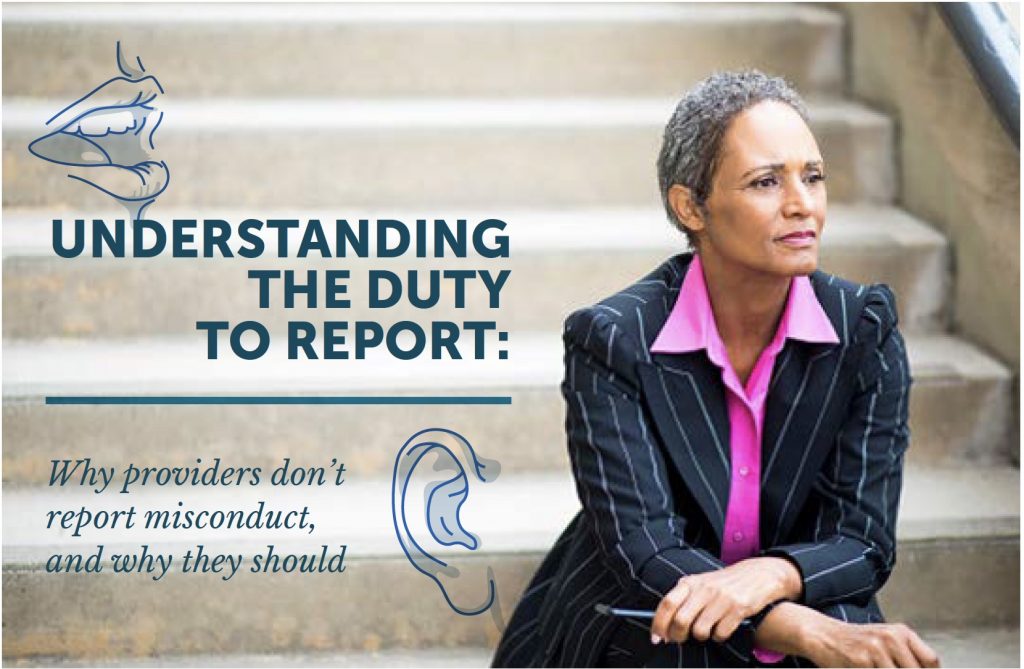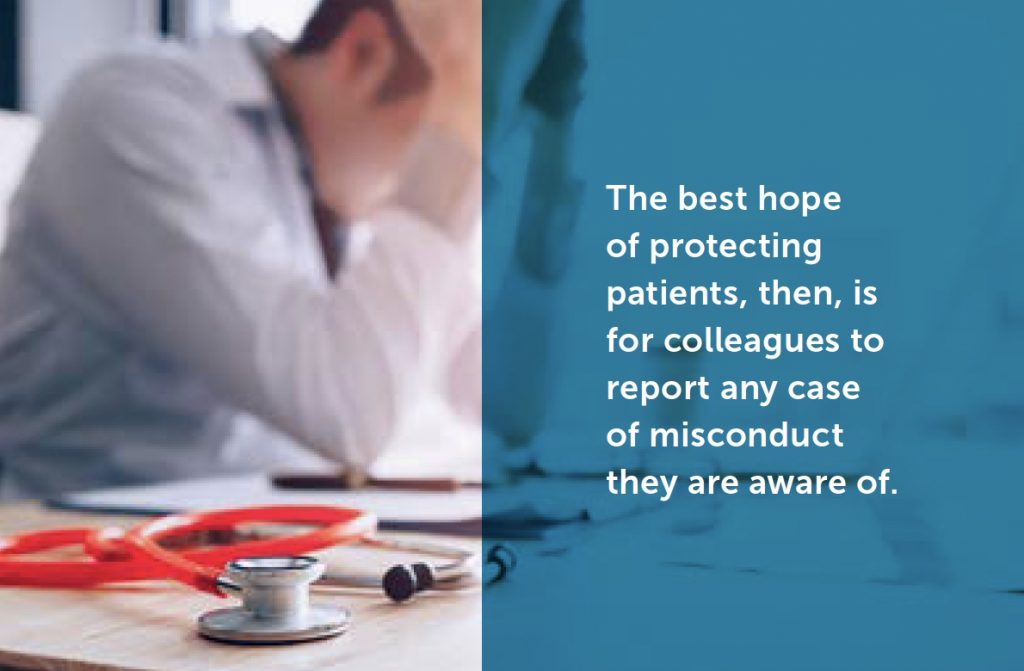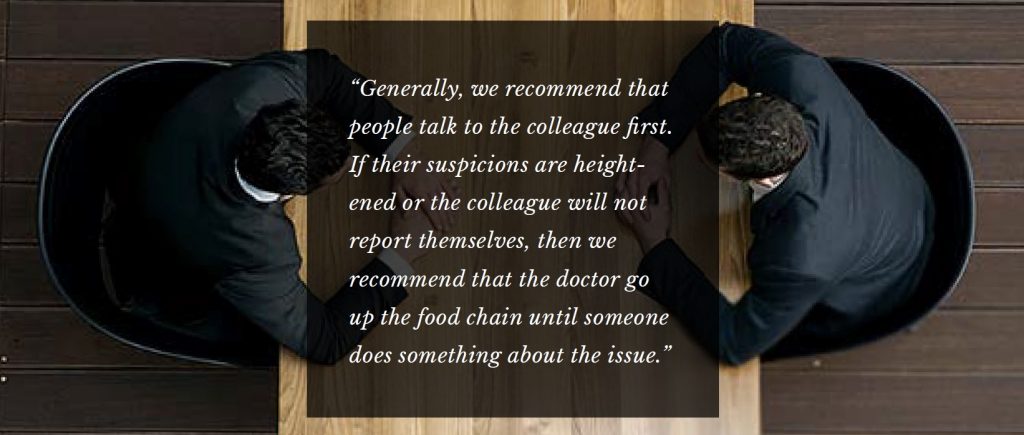Understanding the Duty to Report:
Understanding the Duty to Report:
Why providers don’t report misconduct, and why they should
Asked about their reluctance to report colleagues’ misconduct, many physicians say they are unclear about what’s required. What kinds of misconduct should they report? What if it’s only one instance? What if they are unsure of the facts?

From a legal point of view, the answers to these questions vary considerably from state to state, according to a recent review of state laws by the Atlanta Journal-Constitution. Delaware requires medical professionals to report a colleague when they reasonably believe that person is or may be guilty of un-professional conduct or unfit to practice. Just down the road in Washington, DC, however, the law does not require physicians to report possible violations by fellow doctors. In Minnesota, physicians must grounds for disciplinary action if they have personal knowledge of the violation. In Pennsylvania, physicians have to report colleagues for issues related to addiction and incompetence, but nothing else.
This crazy quilt of laws certainly complicates providers’ attempts to understand their legal obligations. Still, all state residents, including physicians, are obligated to obey state law, and ignorance of the law is no excuse. Board websites generally provide links to the state’s Medical Practice Act, and it is up to each project vider to make use of the information.
Even in places where the law does not specifically require reporting, or narrowly defines the responsibility, all physicians have an unambiguous ethical obligation to report colleagues who they suspect are harming patients. The American Medical Association’s Ethics Code is explicit and extensive on this point. It even spells out to whom various kinds of offenses should be reported.
“Unethical conduct that threatens patient care or welfare should be reported to the appropriate authority for a particular clinical service. Unethical conduct that violates state licensing provisions should be reported to the state licensing board. It is appropriate to report unethical conduct that potentially violates criminal statutes to law enforcement authorities. All other unethical conduct should be reported to the local or state professional medical organization. When the inappropriate conduct of a physician continues despite the initial report(s), the reporting physician should report to a higher or additional authority.” — Opinion 9.031 of the AMA Code, “Reporting Impaired, Incompetent, or Unethical Colleagues”
OBSTACLES OFTEN DISCOURAGE REPORTING. When medical professionals weigh the pros and cons of reporting a colleague’s misconduct, a few considerations often tip the balance towards silence, especially when the chance of being disciplined for not reporting seems vanishingly slight (more on that in the following article).
• Some physicians blame their reluctance on a system that is overly bureaucratic and ineffective. Filing a report, they say, consumes inordinate amounts of time, better spent on patient care. And besides, from what they can see, the reports don’t do any good. Those with power seem never to suffer consequences, while those less powerful
are disciplined too harshly.
• According to participants in FSMB’s recent Duty to Report summit meeting, physicians often fear they will suffer repercussions if they report a colleague’s misconduct. If they report a supervisor, they worry about the risk of outright retribution. If they report a peer, they worry about being ostracized and, notes the FSMB report, “For physicians or other professionals who rely on referrals, such ostracization can have economic impacts.”
• The punitive orientation of the system and its focus on extreme cases also discourage physicians and others from “turning in” colleagues and friends they work with every day. This is especially true when the misconduct is less severe. “Health care providers with moderate performance or behavior issues,” notes the summit report, “may not be reported by others out of concern that taking such an action would be too extreme a step.”
THE BENEFITS OF REPORTING OUTWEIGH THE NEGATIVES. These obstacles can make the duty to report seem onerous, but they cannot obscure its value. Speaking at FSMB’s annual meeting earlier this year, Catherine Caldicott, MD, outlined why reporting misconduct is so important.
The first reason she cited was the obligation to protect patients.
As the Nassar case so clearly demonstrates, patients who are sexually exploited by their doctors often keep the experience to themselves, choosing to suffer in silence rather than risk humiliation and trauma by speaking up.

According to a study of the risk of recidivism in physicians with histories of sexual misconduct published in 2000, fewer than 10% of patients who have been sexually mistreated in a clinical context ever report the violation. “That’s a stunning figure,” said Caldicott. “That statistic means that most physicians who commit sexual misconduct are never held to account. And most patients who are victims of sexual misconduct do not have an opportunity for justice and are not offered support and opportunities for recovery and healing.”
The best hope of protecting patients, then, is for colleagues to report any case of misconduct they are aware of. Since most sexual boundary violations happen behind closed doors, says Caldicott, it’s important for providers to let others know not just what they are certain of, but also what they have reason to suspect, even if hard evidence is lacking. That doesn’t mean every piece of unsubstantiated gossip is to be taken seriously. But whenever providers believe patients may be at risk, they have an obligation to speak up.
Not everything has to be immediately reported to the board. Caldicott, who is a PBI faculty member, says, “Generally, we recommend that people talk to the colleague first. If their suspicions are heightened or the colleague will not report themselves, then we recommend that the doctor go up the food chain until someone does something about the issue.”

At the FSMB meeting, Caldicott emphasized the importance of reporting lesser infractions as well as more serious ones. These relatively minor incidents may not inflict serious harm, but they are often harbingers of trouble to come—a first step onto the slippery slope leading to a violation. Confronting issues before they evolve into more serious problems protects both patients and physicians, said Caldicott.
Early or late, reporting can also ensure that colleagues get the care they need to remain a valuable member of the healthcare community. “The physicians that commit sexual violations are often considered a second victim,” said Caldicott, “because their behavior doesn’t come out of nowhere. It comes out of wants and needs and pain and hurt and trauma—all sorts of back-ground issues that merit attention.”
One objection healthcare professionals raise when they hear this argument is that remediation efforts simply don’t work. The fact is, there is very little research either way, demonstrating or refuting the effectiveness of remediation. “I can’t tell you how many times I’ve been asked about recidivism and whether or not there are any data,” said Caldicott.
She did point to one recent analysis by PBI as a notable exception. Attendees of a 2013 PBI course, which included a longitudinal follow-up component, were tracked over five years. To ensure accuracy, only people from states that provided reliable online access to timely disciplinary updates were chosen. The preliminary analysis found that of the 94 people included, only 10 had actions taken against their licenses for unrelated infractions, such as shoplifting or failure to take a drug test, Caldicott reported. “But none of them repeated the original violation.”
One other concern about offering offenders remediation came from an audience member at the FSMB meet-ing. After hearing about the kinds of intense efforts needed to help a serious offender—possibly including remedial education, psychotherapy and Physician Health Programs—Alexander Gross of the Georgia Board wondered if the public might think, “That’s too little, too late.”
“I don’t know if it’s too little,” answered Caldicott. “But it may very well be too late, which argues for early intervention.” When less harmful behaviors are reported and acted on, she said, less intervention is required and many more patients are spared the trauma of sexual misconduct.
View Other Posts
- New Data Suggest Remedial Courses Reduce Recidivism
- Summer School: Reduce Stressors, Avoid Burnout
- Don’t Wait Until it is Too Late: How a Personalized Protection Plan© Decreases Violation Potential
- The What, Why, When, and How of Remedial Educational Interventions
- Revisiting Moral Courage as an Educational Objective
